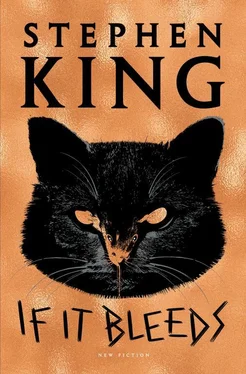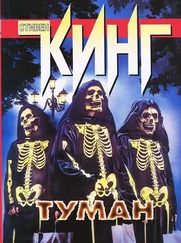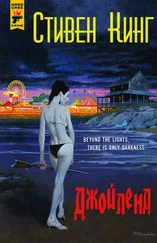8
Chuck went stag to the Fall Fling, which turned out just fine, because all the girls from Twirlers and Spinners wanted to dance with him. Especially Cat, because her boyfriend, Dougie Wentworth, had two left feet and spent most of the evening slouched against the wall with his buddies, all of them sucking up punch and watching the dancers with lordly sneers.
Cat kept asking him when they were going to do their stuff, and Chuck kept putting her off. He said he’d know the right tune when he heard it. It was his bubbie he was thinking of.
Around nine o’clock, half an hour or so before the dance was scheduled to end, the right tune came up. It was Jackie Wilson, singing “Higher and Higher.” Chuck strutted to Cat with his hands out. She kicked off her shoes, and with Chuck in her brother’s Cubans, they were at least close to the same height. They went out on the floor, and when they did a double moonwalk, they cleared it. The kids made a circle around them and began clapping. Miss Rohrbacher, one of the chaperones, was among them, clapping along with the rest and shouting “Go, go, go!”
They did. As Jackie Wilson shouted that happy, gospel-tinged tune, they danced like Fred Astaire, Ginger Rogers, Gene Kelly, and Jennifer Beals all rolled up into one. They finished with Cat spinning first one way, then the other, then collapsing backward into Chuck’s arms with her own held out in a dying swan. He went down in a split that miraculously didn’t rip the crotch out of his pants. Two hundred kids cheered when Cat turned her head and put a kiss on the corner of Chuck’s mouth.
“ One more time! ” some kid shouted, but Chuck and Cat shook their heads. They were young, but smart enough to know when to quit. The best cannot be topped.
9
Six months before he died of a brain tumor (at the unfair age of thirty-nine), and while his mind was still working (mostly), Chuck told his wife the truth about the scar on the back of his hand. It wasn’t a big deal and hadn’t been a big lie, but he’d reached a time in his rapidly diminishing life when it seemed important to clear the books. The only time she’d asked about it (it really was a very small scar), he told her that he had gotten it from a boy named Doug Wentworth, who was pissed about him cavorting with his girlfriend at a middle school dance and pushed him into a chainlink fence outside the gymnasium.
“What actually happened?” Ginny asked, not because it was important to her but because it seemed to be important to him. She didn’t care much about whatever had happened to him in middle school. The doctors said he would probably be dead before Christmas. That was what mattered to her.
When their fabulous dance was over and the DJ put on another, more recent tune, Cat McCoy had run to her girlfriends, who giggled and shrieked and hugged her with a fervency of which only thirteen-year-old girls may be capable. Chuck was sweaty and so hot his cheeks felt on the verge of catching fire. He was also euphoric. All he wanted in that moment was darkness, cool air, and to be by himself.
He walked past Dougie and his friends (who paid absolutely no attention to him) like a boy in a dream, pushed through the door at the back of the gym, and walked out into the paved half-court. The cool fall air doused the fire in his cheeks, but not the euphoria. He looked up, saw a million stars, and understood that for each one of those million, there was another million behind it.
The universe is large, he thought. It contains multitudes. It also contains me , and in this moment I am wonderful. I have a right to be wonderful.
He moonwalked under the basketball hoop, moving to the music inside (when he made his little confession to Ginny he could no longer remember what that music had been, but for the record it was the Steve Miller Band, “Jet Airliner”), and then twirled, his arms outstretched. As if to embrace everything.
There was pain in his right hand. Not big pain, just your basic ouch, but it was enough to bring him out of his joyous elevation of spirit and back to earth. He saw that the back of his hand was bleeding. While he was doing his whirling dervish bit under the stars, his outflung hand had struck the chainlink fence and a protruding jut of wire had cut him. It was a superficial wound, hardly enough to merit a Band-Aid. It left a scar, though. A tiny white crescent scar.
“Why would you lie about that?” Ginny asked. She was smiling as she picked up his hand and kissed the scar. “I could understand it if you’d gone on to tell me how you beat the big bully to a pulp, but you never said that.”
No, he’d never said that, and he’d never had a bit of trouble with Dougie Wentworth. For one thing, he was a cheerful enough galoot. For another, Chuck Krantz was a seventh-grade midget unworthy of notice.
Why had he told the lie, then, if not to cast himself as the hero of a fictional story? Because the scar was important for another reason. Because it was part of a story he couldn’t tell, even though there was now an apartment building standing on the site of the Victorian house where he had done most of his growing up. The haunted Victorian house.
The scar meant more, so he had made it more. He just couldn’t make it as much more as it really was. That made little sense, but as the glioblastoma continued its blitzkrieg, it was the best his disintegrating mind could manage. He had finally told her the truth of how the scar actually happened, and that would have to do.
10
Chuck’s grandpa, his zaydee, died of a heart attack four years after the Fall Fling dance. It happened while Albie was climbing the steps of the public library to return a copy of The Grapes of Wrath —which, he said, was every bit as good as he remembered. Chuck was a junior in high school, singing in a band and dancing like Jagger during the instrumental breaks.
Grandpa left him everything. The estate, once quite large, had shrunk considerably over the years since Grandpa’s early retirement, but there was still enough to pay for Chuck’s college education. Later on, the sale of the Victorian paid for the house (small but in a good neighborhood, with a lovely back room for a nursery) he and Virginia moved into after their honeymoon in the Catskills. As a new hire at Midwest Trust—a humble teller—he never could have bought the place without Grandpa’s inheritance.
Chuck flatly refused to move to Omaha to live with his mother’s parents. “I love you guys,” he said, “but this is where I grew up and where I want to stay until I go to college. I’m seventeen, not a baby.”
So they, both long retired, came to him and stayed in the Victorian with him for the twenty months or so before Chuck went off to the University of Illinois.
They weren’t able to be there for the funeral and burial, however. It happened fast, as Grandpa had wanted, and his mom’s folks had loose ends to tie up in Omaha. Chuck didn’t really miss them. He was surrounded by friends and neighbors he knew much better than his mother’s goy parents. A day before they were scheduled to arrive, Chuck finally opened a manila envelope that had been sitting on the table in the front hall. It was from the Ebert-Holloway Funeral Parlor. Inside were Albie Krantz’s personal effects—at least those that had been in his pockets when he collapsed on the library steps.
Chuck dumped the envelope out on the table. There was a rattle of coins, a few Halls cough drops, a pocket knife, the new cell phone Grandpa had barely had a chance to use, and his wallet. Chuck picked up the wallet, smelled its old limp leather, kissed it, and cried a little. He was an orphant now for sure.
There was also Grandpa’s keyring. Chuck slipped this over the index finger of his right hand (the one with the crescent-shaped scar) and climbed the short and shadowy flight of stairs to the cupola. This last time he did more than rattle the Yale padlock. After some searching, he found the right key and unlocked it. He left the lock hanging from the hasp and pushed the door open, wincing at the squeal of the old unoiled hinges, ready for anything.
Читать дальше








